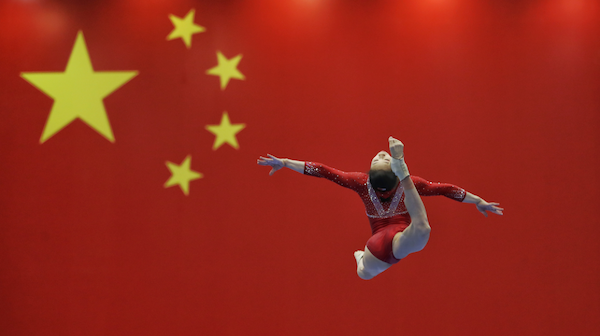
Ou Yushan | Photo thanks to 体操圈
China held its final two Olympic selection meets at the end of last week, and named both the women’s and men’s teams immediately after the competitions.
Zhang Jin, a member of China’s bronze medal-winning 2018 world championships team who won both of the women’s trials after finishing second all-around at nationals, will headline the team alongside 2019 world all-around silver medalist Tang Xijing, 2019 Asian Championships all-around silver medalist Lu Yufei, and 2019 junior world all-around bronze medalist Ou Yushan.
The federation also selected the 16-year-old brilliant beam worker Guan Chenchen to compete as an individual in Tokyo alongside 2016 Olympian Fan Yilin, who won a nominative berth via the apparatus world cups.
The Chinese team is missing world beam medalist Li Shijia, one of the top contenders who suffered an injury just prior to the first trial and wasn’t able to get back in time. Li’s absence is disappointing, but thanks to China’s depth this year, it is not a blow to the overall quality of the team, and in fact, there are still some reserve gymnasts who could contribute just as much as those selected, like Wei Xiaoyuan and Qi Qi.
Both Wei and Qi are more specialists than all-arounders, with Wei a standout on bars while Qi has some of the team’s strongest work on vault and floor, though it seems the selection committee went with a group of gymnasts who are more balanced all-arounders who can contribute anywhere if needed rather than risk potentially weak scores across the board just to get strong results on one particular event.
Wei did finish second all-around this week, posting the top bars score in addition to the third best score on floor with the best routine of her career, but historically her all-around results have been a bit lower than those selected, with her vault and floor generally not up to par. Those selected performed well both this week and throughout the season, and all have major international all-around medals – world championships, world cups, and continental championships – to their names, and China is also not leaving any top individual medal contenders behind, aside from potentially Wei with her bars.
There was a bit of controversy in selecting the men’s team with China leaving out Zhang Boheng, this year’s national silver all-around medalist and floor champion who won the final trial with an 88.565, the highest men’s all-around score of the year globally.
Reasoning that Zhang was a risk as an athlete with no international experience, the selection committee ultimately went with 2017 world all-around champion Xiao Ruoteng, 2016 Olympic medalist and six-time world medalist Lin Chaopan, 2018 world team gold medalist Sun Wei, and two-time world parallel bars champion Zou Jingyuan, who competed only three events at the trial, but can contribute some make-it-or-break-it scores on both parallel bars and pommels to give the men a needed boost in the team final.
In this sense, the men’s program took a risk that the women’s program did not. Though his scores on the majority of apparatuses aren’t nearly China’s best, Zou can compete all six events in qualifications if needed so the team won’t have to go three-up three-count anywhere, and even if they do end up counting his floor or high bar, it’s not like he’d do so much damage that China would miss the team final completely. I’d imagine they’ll list him at the end of the lineup for his weaker events and only use him if there are falls or major mistakes earlier in the rotation.
Putting Zou up in a team final, even just for his parallel bars, is worth the gamble of a potentially lower team score in qualifications, but if one of China’s all-arounders ends up injured and unable to compete leg events in the team final, for example, Zou will not be able to step in at the same level another more balanced all-arounder could. The chances of this happening are slim, however, so I think when weighing the pros and cons, this decision makes sense.
I do question taking Lin over Zhang, however. Not only did Zhang outscore the veteran by three points at the final trial, but Lin – fourth all-around at the test competition – has underperformed over the past couple of years in general. I’d argue that he is more of a risk than Zhang is, especially as Zhang has a better recent track record on floor and vault, two of the events where the team will have holes in the final. Lin was also the only gymnast out of the eight who competed at trials who did not place in the top three on any event, while Zhang was in the top three on all but pommels and rings, so the decision is certainly questionable.
In addition to those selected for the team, Liu Yang, who missed out on a world cup berth after a last-minute upset from Eleftherios Petrounias of Greece, was awarded an individual spot after earning a 15.7 on rings at last week’s trial, while You Hao was able to pick up a nominative berth on parallel bars at the world cups once Liu was knocked out.
Article by Lauren Hopkins
